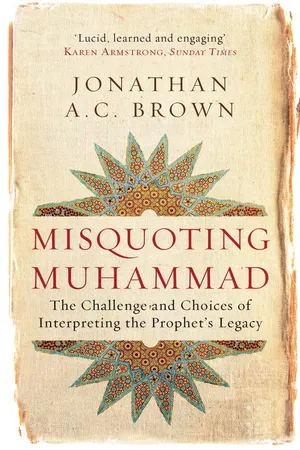A Oneworld Book
This ebook edition published by Oneworld Publications 2014
First published in North America, Great Britain and Australia by
Oneworld Publications 2014
Copyright © Jonathan A.C. Brown 2014
The moral right of Jonathan A.C. Brown to be identified as the Author of this work has been asserted by him in accordance with the Copyright, Designs and Patents Act 1988
All rights reserved
Copyright under Berne Convention
A CIP record for this title is available from the British Library
ISBN 978-1-78074-420-9
eBook ISBN 978-1-78074-421-6
Typeset by Tetragon, London
Oneworld Publications
10 Bloomsbury Street
London WC1B 3SR
England
Contents
- List of Illustrations
- Foreword
- Preface
- Acknowledgments
- Notes on dates, transliteration, abbreviations and citations
- 1. The Problem(s) with Islam
- A world full of God
- Taking Islamic scripture and its interpreters seriously
- 2. A Map of the Islamic Interpretive Tradition
- The word of God, the teachings of His Prophet and the mind of man
- Obey God and obey His Messenger
- The beginnings of the Islamic interpretive tradition
- Abu Hanifa and the Partisans of Reason
- Malik and the authority of custom
- The power of reason: the Greek legacy and Islamic theology
- Shafi‘i and the beginnings of Sunni Islam
- The collection and criticism of Hadiths
- Putting reason in its place in Sunni theology and law
- The great convergence of Sunni Islam
- Legal theory and its discontents
- Sufism and inspiration from God
- The iconoclasts and Islamic revival
- Twilight of an era
- 3. The Fragile Truth of Scripture
- A crisis of confidence
- Canons and reading scripture with charity
- The turning over of an era
- Reading scripture so it’s true
- The Islamic science of epistemology and interpretation (Usul al-Fiqh)
- The language of God and the rhetoric of His Prophet
- The Qur’an: valid for all times and places
- Hadiths and interpreting the life of the Prophet
- Changing times and the reasons behind scriptural law
- The interaction of the Qur’an and Hadiths in time
- Into the weeds: the case of raising one’s hands in prayer
- The summer of the liberal age
- 4. Clinging to the Canon in a Ruptured World
- Upstarts at the end of time
- The treason of interpretation
- Heresy acceptable: ruptures in canonical communities
- Slay the unbelievers wherever you find them: jihad and (re)interpreting scripture
- Women cannot lead: historicizing scripture versus God’s inscrutable law
- Sex with little girls: interpreting scripture amid changing norms
- The ulama, the state and Shariah authenticity without scripture
- The court must not be political – morality and truth in a ruptured world
- 5. Muslim Martin Luthers and the Paradox of Tradition
- The paradox of interpretive control
- The rule of interpretation in the conflict between Sunni and Shiite Islam
- Tradition as governor, scripture as subject
- Killing one’s children: tradition betraying scripture
- Reconsidering the penalty for apostasy: tradition redeeming scripture
- Women leading prayer: should scripture trump tradition?
- The ‘Qur’an Only’ movement
- No escaping tradition
- The price of reformation
- The guide of tradition: a necessary but thankless job
- 6. Lying about the Prophet of God
- The truth, what’s that?
- Noble Lies and profound truths
- The ulama as guardians
- Appealing to the flesh: using unreliable Hadiths in Sunni Islam
- A familiar habit: assisting truth in Western scripture and historiography
- Seventy-two virgins: pragmatic truth and the heavenly reward of martyrs
- The cost of Noble Lying
- Muslim objections to the Noble Lie
- Genre versus book: reviving an old approach to authenticating Hadiths
- The dangers of Noble Lying for Muslims today
- Pragmatic truth and the beauty of Noble Lying
- 7. When Scripture Can’t Be True
- The Qur’an and domestic violence
- Who decides what God means?
- Courts have the final word
- Saying ‘no’ to the text and the hermeneutics of suspicion
- Appendix I: Marracci and Ockley on Aisha’s Marriage to the Prophet
- Appendix II: Hadiths on a Parent Killing His Child
- Ratings of the Hadith by Muslim critics
- Examination of individual narrations
- My evaluation of the Hadith
- Citations for Hadith of a Father Killing His Child
- Appendix III: The Hadith of riba and Incest
- Ratings by Hadith critics
- My evaluation of the Hadith of Riba and Incest
- Citations for the Hadith
- Appendix IV: The Hadith of the Seventy-Two Virgins
- Overall rating
- Citations for the Hadith of the Seventy-Two Virgins
- Notes
- Select Bibliography
- Illustrations
List of Illustrations
Figure 1: The Red Fort in Delhi
Figure 2: The Al-Azhar Mosque in Cairo
Figure 3: Visitors to the shrine of Ahmad Badawi in Egypt
Figure 4: Celebrating the Prophet’s birthday in Delhi
Figure 5: Tawfiq Sidqi, Egyptian reformer
Figure 6: Tomb of Bukhari in Samarqand
Figure 7: Muhemmet Zahit Kevseri
Figure 8: Interior of the Fatih Mosque, Istanbul
Figure 9: The area included in the ‘Peninsula of the Arabs’
Figure 10: The chief ideologue of the Jama‘a Islamiyya in Egypt
Figure 11: A young Muhammad Ghazali
Figure 12: An older Muhammad Ghazali leads prayer
Figure 13: Shaykh Ali Gomaa
Figure 14: Yasir Burhami as Egypt’s ‘most dangerous man’
Figure 15: The Jenderami Pondok in Malaysia
Figure 16: Genealogy of knowledge for the Jenderami school
Figure 17: Genealogy of knowledge for the Ba’alawi Sufis
Figure 18: Sayyid Naqib al-Attas
Figure 19: The city of Hajrayn in the Hadramawt Valley, Yemen
Figure 20: Chart for the Hadith of a Parent Killing their Child
For my beloved wife Laila,
who inspires me every day
Islam in the Twenty-First Century
Series Editor: Omid Safi
ALSO IN THIS SERIES:
Inside the Gender Jihad, Amina Wadud
Sexual Ethics in Islam, Kecia Ali
Progressive Muslims, Ed. Omid Safi
‘In every object there is inexhaustible meaning; the eye sees in it what the eye brings means of seeing.’
THOMAS CARLYLE
The French Revolution
Foreword
The Prophet Muhammad remains indispensable. The great debates of modern Islam – debates that, as this book shows, are great human debates – continue to be fought through the legacy of the Prophet, in his name, because of the Prophet, and in spite of him.
He is always present among Muslims. They continue to praise their Prophet and recall his virtues in sermons, devotional songs, and books galore. Today, as in centuries past, those who fear, are ignorant of, or hate Islam have zeroed in on the Prophet as the manifestation of their phobias, blasting him in books and YouTube clips. And so the Prophet’s persona and legacy serve as vehicles for both the highest aspirations of M...



